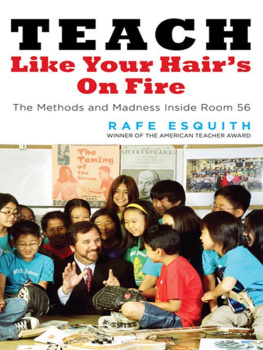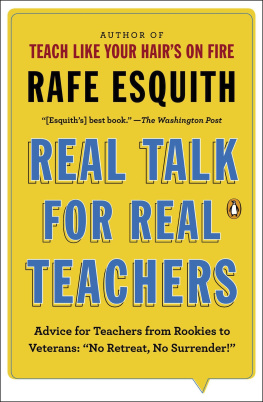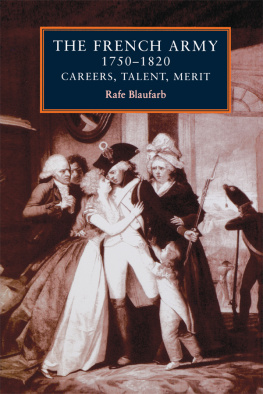ALSO BY RAFE ESQUITH
There Are No Shortcuts
TEACH LIKE YOUR
HAIRS ON FIRE
The Methods and Madness
Inside Room 56
RAFE ESQUITH
VIKING
VIKING
Published by the Penguin Group
Penguin Group (USA) Inc., 375 Hudson Street, New York, New York 10014, U.S.A. Penguin Group (Canada), 90 Eglinton Avenue East, Suite 700, Toronto, Ontario, Canada M4P 2Y3 (a division of Pearson Penguin Canada Inc.) Penguin Books Ltd, 80 Strand, London WC2R 0RL, England Penguin Ireland, 25 St. Stephens Green, Dublin 2, Ireland (a division of Penguin Books Ltd) Penguin Books Australia Ltd, 250 Camberwell Road, Camberwell, Victoria 3124, Australia (a division of Pearson Australia Group Pty Ltd) Penguin Books India Pvt Ltd, 11 Community Centre, Panchsheel Park, New Delhi 110 017, India Penguin Group (NZ), Cnr Airborne and Rosedale Roads, Albany, Auckland 1310, New Zealand (a division of Pearson New Zealand Ltd) Penguin Books (South Africa) (Pty) Ltd, 24 Sturdee Avenue, Rosebank, Johannesburg 2196, South Africa
Penguin Books Ltd, Registered Offices: 80 Strand, London WC2R 0RL, England
First published in 2007 by Viking Penguin, a member of Penguin Group (USA) Inc.
Copyright Rafe Esquith, 2007
All rights reserved
The photographs by
AUTHORS NOTE: Although this book is based on true events, the students and teachers described are either composites of individuals I have observed over twenty-five years of teaching or their names and characteristics have been changed. Any attempt by an individual to identify him or herself would be a mistake. The only individual flaws in this book are my own.
ISBN: 978-1-1012-0191-6
Without limiting the rights under copyright reserved above, no part of this publication may be reproduced, stored in or introduced into a retrieval system, or transmitted, in any form or by any means (electronic, mechanical, photocopying, recording or otherwise), without the prior written permission of both the copyright owner and the above publisher of this book.
Version_6
For the Hobart Shakespeareans,
who have been my best teachers
and for Barbara
Contents
PROLOGUE
Fire in the Classroom
It is a strange feeling to write this book. I am painfully aware that I am not superhuman. I do the same job as thousands of other dedicated teachers who try to make a difference. Like all real teachers, I fail constantly. I dont get enough sleep. I lie awake in the early-morning hours, agonizing over a kid I was unable to reach. Being a teacher can be painful.
For almost a quarter of a century, I have spent the majority of my time in a tiny, leaky classroom in central Los Angeles. Because of a little talent and a lot of luck, I have been fortunate to receive some recognition for my work. Not a day goes by when I do not feel overwhelmed by the attention.
I doubt that any book can truly capture the Hobart Shakespeareans. However, it is certainly possible to share some of the things Ive learned over the years that have helped me grow as a teacher, parent, and person. For almost twelve hours a day, six days a week, forty-eight weeks a year, my fifth-graders and I are crowded into our woefully insufficient space, immersed in a world of Shakespeare, algebra, and rock n roll. For the rest of the year, the kids and I are on the road. While my wife believes me to be eccentric, good friends of mine have not been so gentle, going as far as to label me quixotic at best and certifiable at worst.
I dont claim to have all the answers; at times it doesnt feel as if Im reaching as many students as I succeed with. Im here only to share some of the ideas I have found useful. Some of them are just plain common sense, and others touch on insanity. But there is a method to this madness. It is my hope that some parents and teachers out there will agree with me that our culture is a disaster. In a world that considers athletes and pop stars more important than research scientists and firefighters, it has become practically impossible to develop kind and brilliant individuals. And yet weve created a different world in Room 56. Its a world where character matters, hard work is respected, humility is valued, and support for one another is unconditional. Perhaps when parents and teachers see this, and realize that my students and I are nothing special, they will get a few ideas and take heart.
I am sad when I see so many good teachers and parents surrender to forces that sap their potential excellence. The demons are everywhere. Those who care deeply often feel outgunned by apathetic or incompetent administrators and politicians. Expectations for children are often ridiculously low. Racism, poverty, and ignorance often reign supreme on campus. Add to this mix ungrateful students, and even mean-spirited people in the teaching profession itself, and the hardiest of souls can be crushed. Each defeat usually means that a childs true potential will not be developed.
I was fortunate to have a ridiculous moment in the classroom that literally lit my way out of the darkness. Years ago, feeling tired and frustrated, I spent a few weeks searching my soul and did something I rarely doI questioned whether teaching was worth it anymore. A combination of the aforementioned demons had beaten me down, and I was practically down for the count.
But for some reason, when I was guilty of feeling sorry for myself, I spent a day paying extra attention to a kid in class whom I liked very much. She was one of those kids who always seem to be the last one picked for the team, a quiet girl who appeared to have accepted the idea that she could never be special. I was determined to convince her that she was wrong.
I was teaching a chemistry lesson, and the students were excited about working with alcohol lamps. But the girl couldnt get her wick to burn. The rest of the class wanted to move on with their projects, but I told everyone to wait. I was not going to leave her behind, even after she told me to continue with the others and not worry about her.
Normally I do not interfere with science projects, because failure can be part of the learning process. Yet this was simply a matter of faulty equipment; it had nothing to do with the chemical principle we were exploring that morning. I needed to step in. The girl had tears in her eyes, and I felt ashamed of myself for ever having felt like giving up. Suddenly her sadness was all that mattered.
Athletes often refer to getting into the zone when they forget about the crowd and the pressure and see only the ball. It can happen in other fields too. For that one moment, the only thing that mattered to me was that this girl should have a successful experiment. She was going to go home that day with a smile on her face. I bent closely over the wick of her alcohol lamp. For some reason the wick was not as long as it should have beenI could barely see it. I leaned as close as I could, and with a long kitchen match tried to reach it. I was so close to the match that I could feel the flame as I tried to ignite the lamp. I was determined to get the lamp working. And it started working! The wick caught fire, and I looked up triumphantly to see the smile I expected on the girls face.
Instead, she took one look at me and began screaming in fear. Other kids started yelling as well. I did not understand why they were all pointing at me, until I realized that while I was lighting the lamp, the flame had touched my hair; it was now smoldering and scaring the hell out of the children. Several of them ran to me and swiped at my head. Talk about a dream come truethey got to hit their teacher on the head and say they were trying to help him.





